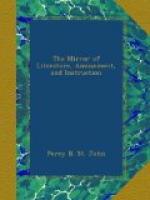Then dazzled eyes, with pride which great ambition blindes,
Shall be unveil’d by worthy wights, whose foresight falshood finds.
The daughter of debate, that eke discord doth sowe,
Shall reape no gaine, where former rule hath taught still peace to growe.
No forreine banish’d wight shall ancre in this port;
Our realme it brooks no stranger’s force, let them elsewhere resort.
Our rusty sword with rust shall first his edge employ,
To polle their toppes that seeke such change, and gape for joy.
J.G.B.
* * * * *
NOTES OF A READER.
* * * * *
Quarterly review. No. 87.
Character of Mr. Canning.
There have been some who equalled him in acquirements—many who have possessed sounder judgment and sounder principles; but never was there in any legislative assembly, a person whose talents were more peculiarly and perfectly adapted to the effect which he intended to produce. With all the advantages of voice and person—with all the graces of delivery—with all the charms which affability and good-nature impart to genius, he had wit at will, as well as eloquence at command. Being frank and sincere in all his political opinions, he had all that strength in his oratory which arises from sincerity, although in his political conduct the love of intrigue was one of his besetting sins. By an unhappy perversion of mind it seemed as if he would always rather have obtained his end by a crooked path than by a straight one; but his speeches had nothing of this tortuosity; there was nothing covert in them, nothing insidious—no double-dealing, no disguise. His argument went always directly to the point, and with so well-judged an aim that he was never (like Burke) above his mark—rarely, if ever, below it, or beside it. When, in the exultant consciousness of personal superiority, as well as the strength of his cause, he trampled upon his opponents, there was nothing coarse, nothing virulent, nothing contumelious, nothing ungenerous in his triumph. Whether he addressed the Liverpool electors, or the House of Commons, it was with the same ease, the same adaptation to his auditory, the same unrivalled dexterity, the same command of his subject and his hearers, and the same success. His only faults as a speaker were committed when, under the inebriating influence of popular applause, he was led away by the heat and passion of the moment. A warm friend, a placable adversary, a scholar, a man of letters, kind in his nature, affable in his manners, easy of access, playful in conversation, delightful in society—rarely have the brilliant promises of boyhood been so richly fulfilled as in Mr. Canning.
Political Economists




